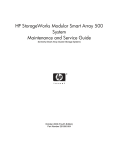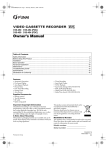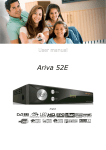Download Compaq R3000 XR User's Manual
Transcript
UPS R3000 XR Maintenance and Service Guide First Edition (September 2000) Part Number 221891-001 Spare Part Number 223932-001 Compaq Computer Corporation Notice © 2000 Compaq Computer Corporation COMPAQ, the Compaq logo, Compaq Insight Manager, and SmartStart Registered in U.S. Patent and Trademark Office. All other product names mentioned herein may be trademarks of their respective companies. Compaq shall not be liable for technical or editorial errors or omissions contained herein. The information in this document is subject to change without notice. THE INFORMATION IN THIS PUBLICATION IS PROVIDED “AS IS” WITHOUT WARRANTY OF ANY KIND. THE ENTIRE RISK ARISING OUT OF THE USE OF THIS INFORMATION REMAINS WITH RECIPIENT. IN NO EVENT SHALL COMPAQ BE LIABLE FOR ANY DIRECT, CONSEQUENTIAL, INCIDENTAL, SPECIAL, PUNITIVE OR OTHER DAMAGES WHATSOEVER (INCLUDING WITHOUT LIMITATION, DAMAGES FOR LOSS OF BUSINESS PROFITS, BUSINESS INTERRUPTION OR LOSS OF BUSINESS INFORMATION), EVEN IF COMPAQ HAS BEEN ADVISED OF THE POSSIBILITY OF SUCH DAMAGES AND WHETHER IN AN ACTION OF CONTRACT OR TORT, INCLUDING NEGLIGENCE. The limited warranties for Compaq products are exclusively set forth in the documentation accompanying such products. Nothing herein should be construed as constituting a further or additional warranty. Compaq UPS R3000 XR Maintenance and Service Guide First Edition (September 2000) Part Number 221891-001 Spare Part Number 223932-001 Contents About This Guide Symbols in Text .......................................................................................................... v Compaq Technician Notes .........................................................................................vi Where to Go for Additional Help ...............................................................................vi Telephone Numbers ...........................................................................................vii Chapter 1 Before You Begin Safety and Product Information................................................................................1-1 Symbols on Equipment .....................................................................................1-1 Technician Notes...............................................................................................1-2 Rack ..................................................................................................................1-2 Weight ...............................................................................................................1-2 Communication Ports........................................................................................1-3 Extended Runtime Modules and Batteries ........................................................1-3 Remote Emergency Power Off (REPO)............................................................1-4 Chapter 2 Illustrated Parts List Exploded View .........................................................................................................2-2 Chapter 3 Removal and Replacement Procedures Before You Begin.....................................................................................................3-1 Replaceable Parts ..............................................................................................3-1 Tools Required ..................................................................................................3-2 Identifying Components ...........................................................................................3-2 Front Panel ........................................................................................................3-2 Front Panel Controls and LED Display.............................................................3-3 Rear Panel Components ....................................................................................3-4 Modes of Operation..................................................................................................3-6 Standby Mode ...................................................................................................3-6 Operate Mode....................................................................................................3-6 Configure Mode ................................................................................................3-6 Auto-Bypass Mode............................................................................................3-6 Powering Down the UPS..........................................................................................3-7 Emergency Shutdown .......................................................................................3-7 iv Compaq UPS R3000 XR Maintenance and Service Guide Removal and Replacement Procedures continued Replacing the UPS Battery Pack ..............................................................................3-8 Disposing of Used Batteries ............................................................................3-10 Replacing the Electronics Module..........................................................................3-11 Replacing an Option or Communication Board .....................................................3-14 Replacing the UPS Unit..........................................................................................3-16 Extended Runtime Modules ...................................................................................3-17 Replacing ERM Battery Packs ........................................................................3-17 Replacing an ERM ..........................................................................................3-20 Chapter 4 Troubleshooting Troubleshooting During Start...................................................................................4-1 Troubleshooting After Start......................................................................................4-2 Chapter 5 Specifications Physical Specifications.............................................................................................5-1 Input Specifications..................................................................................................5-2 Output Specifications ...............................................................................................5-3 Overcurrent Protection .............................................................................................5-5 Battery Specifications...............................................................................................5-5 Battery Runtime .......................................................................................................5-5 Environmental Specifications...................................................................................5-6 Index About This Guide This Maintenance and Service Guide is a troubleshooting guide that can be used for reference when servicing Compaq R3000 XR series of Uninterruptible Power Systems (UPSs). WARNING: To reduce the risk of personal injury from electrical shock and hazardous energy levels, only authorized service technicians should attempt to repair this equipment. Improper repairs could create conditions that are hazardous. IMPORTANT: The installation of options and servicing of this product shall be performed by individuals who are knowledgeable of the procedures, precautions, and hazards associated with equipment containing hazardous energy circuits. Symbols in Text These symbols may be found in the text of this guide. They have the following meanings: WARNING: Text set off in this manner indicates that failure to follow directions in the warning could result in bodily harm or loss of life. CAUTION: Text set off in this manner indicates that failure to follow directions could result in damage to equipment or loss of information. IMPORTANT: Text set off in this manner presents clarifying information or specific instructions. NOTE: Text set off in this manner presents commentary, sidelights, or interesting points of information. vi Compaq UPS R3000 XR Maintenance and Service Guide Compaq Technician Notes WARNING: Only authorized technicians trained by Compaq should attempt to repair this equipment. All troubleshooting and repair procedures are detailed to allow only subassembly/module level repair. Because of the complexity of the individual boards and subassemblies, no one should attempt to make repairs at the component level or to make modifications to any printed wiring board. Improper repairs can create a safety hazard. Any indications of component replacement or printed wiring board modifications may void any warranty. WARNING: To reduce the risk of personal injury from electrical shock and hazardous energy levels, do not exceed the level of repair specified in these procedures. Because of the complexity of the individual boards and subassemblies, do not attempt to make repairs at the component level or to make modifications to any printed wiring board. Improper repairs could create conditions that are hazardous. WARNING: To reduce the risk of electric shock or damage to the equipment: If the system has multiple power supplies, disconnect power from the system by unplugging all power cords from the power supplies. Do not disable the power cord grounding plug. The grounding plug is an important safety feature. Plug the power cord into a grounded (earthed) electrical outlet that is easily accessible at all times. CAUTION: To properly ventilate your system, you must provide at least 12 inches (30.5 cm) of clearance at the front and back of the UPS. CAUTION: The UPS is designed to be electrically grounded. To ensure proper operation, plug the AC power cord into a properly grounded AC outlet only. Where to Go for Additional Help In addition to this guide, the following information sources are available: ■ User Documentation ■ Compaq Service Quick Reference Guide ■ Service Training Guides ■ Compaq Service Advisories and Bulletins ■ Compaq QuickFind ■ Compaq Insight Manager ■ Compaq Download Facility: Call 1-281-518-1418 TM About This Guide Telephone Numbers For the name of your nearest Compaq Authorized Reseller: ■ In the United States, call 1-800-345-1518 ■ In Canada, call 1-800-263-5868 For Compaq technical support: ■ In the United States and Canada, call 1-800-386-2172 ■ For Compaq technical support phone numbers outside the United States and Canada, visit the Compaq website at http://www.compaq.com vii Chapter 1 Before You Begin Safety and Product Information WARNING: The Compaq Uninterruptible Power System (UPS) R3000 XR contains hazardous voltage levels and energy circuits. There is a risk of personal injury from electrical shock and hazardous energy levels. Persons performing installation or service procedures must be Trained Service Technicians, knowledgeable about the procedures, precautions, and hazards associated with AC Power Products. Symbols on Equipment These icons may be located on equipment in areas where hazardous conditions may exist. Any surface or area of the equipment marked with these symbols indicates the presence of electrical shock hazards. Enclosed area contains no operator serviceable parts. WARNING: To reduce risk of injury from electrical shock hazards, do not open this enclosure. Any surface or area of the equipment marked with these symbols indicates the presence of a hot surface or hot component. If this surface is contacted, the potential for injury exists. WARNING: To reduce the risk of injury from a hot component, allow the surface to cool before touching. Any product or assembly marked with these symbols indicates that the component exceeds the recommended weight for one individual to handle safely. weight kg weight lb WARNING: To reduce the risk of personal injury or damage to the equipment, observe local health and safety requirements and guidelines for manual material handling. 1-2 Compaq UPS R3000 XR Maintenance and Service Guide Technician Notes WARNING: To reduce the risk of personal injury from electrical shock and hazardous energy levels: Only authorized technicians trained by Compaq should attempt to repair this equipment. The installation of options and routine maintenance and service of this product must be performed by Trained Service Technicians who are knowledgeable about the procedures, precautions, and hazards associated with AC Power Products. Do not exceed the level of repair specified in these procedures. All troubleshooting and repair procedures are detailed to allow only subassembly/module level repair. Because of the complexity of the individual boards and subassemblies, no one should attempt to make repairs at the component level or to make modifications to any printed wiring board. Improper repairs can create a safety hazard. Remove all watches, rings, and any other metal or loose-fitting jewelry. Avoid the use of conductive tools that could bridge live parts. Rack WARNING: To reduce the risk of personal injury or damage to the equipment, ensure that: The leveling jacks are extended to the floor. The full weight of the rack rests on the leveling jacks. The stabilizing feet are attached to the rack for a single rack installation. The racks are coupled in multiple rack installations. You extend only one component at a time. A rack may become unstable if more than one component is extended for any reason. Weight WARNING: The UPS R3000 XR weighs 82 lb (37 kg) when fully assembled. The battery pack weighs 42 lb (19 kg). To reduce the risk of personal injury or damage to the equipment: 82 lb 37 kg Observe local health and safety requirements and guidelines for manual material handling. Obtain adequate assistance to lift and stabilize the product during installation or removal. Remove all pluggable options and batteries to reduce the overall weight of the product. Install the UPS R3000 XR and the Extended Runtime Modules (ERMs) only at the bottom of the rack. If placed in a rack with existing equipment, the rack must be reconfigured to allow installation of the UPS at the bottom of the rack. Mount the UPS R3000 XR only on the fixed rails included in the UPS package. Refer to the appropriate installation card and rack template, shipped with the UPS R3000 XR kit, for instructions on rack-mounting the UPS. Before You Begin Communication Ports CAUTION: To reduce the risk of damage to the equipment, only use the DE9 UPS/Computer Interface cable supplied by Compaq (part number 201092-00X) to connect the communications port to the host computer. Do not use standard RS-232 cables. This UPS/Computer Interface Cable carries power and is specifically designed for UPS communications. Extended Runtime Modules and Batteries Observe these precautions when handling or connecting batteries and Extended Runtime Modules. WARNING: To reduce risk of personal injury from electric shock or damage to equipment: A Trained Service Technician must install all batteries and the Extended Runtime Modules (ERMs). Do not attempt to replace batteries unless all battery circuit breakers on any connected ERMs are in the OFF (down) position. There is a 120-volt potential across the batteries. WARNING: To reduce the risk of personal injury or equipment damage, adhere to the following precautions when handling batteries: Make sure that only qualified personnel handle or connect the batteries. Remove watches, rings, or other metal objects prior to working with the equipment. Use tools with insulated handles. Do not attempt to replace batteries unless all battery circuit breakers on any connected ERMs are in the OFF (down) position. There is a 120-volt potential across the batteries. This UPS contains sealed lead-acid batteries. To reduce the risk of fire or chemical burns, adhere to the following precautions: Do not attempt to recharge batteries after removal from the UPS. Do not disassemble, crush, or puncture the batteries. Do not short the external contacts of the batteries. Do not immerse the batteries in water. Do not expose the batteries to temperatures higher than 60°C or dispose of in fire. Use only the Compaq battery spare designated for this UPS. 1-3 1-4 Compaq UPS R3000 XR Maintenance and Service Guide THIS PRODUCT CONTAINS A NONSPILLABLE BATTERY Next Recharge Date: 14-DEC-01 Please refer to Maintenance Section of Owner's Manual enclosed inside Figure 1-1. Checking the battery recharge date label IMPORTANT: Do not use the batteries if the recharge date has passed (Figure 1-1). If the date on the Battery Recharge Date Label has passed without the batteries being recharged, contact an Authorized Compaq Service Representative. IMPORTANT: Compaq recommends that you do not maintain an inventory of spare batteries on-site unless you implement a procedure to keep these batteries charged while in storage. Do not dispose of used batteries with general office or household waste. Return the used battery for proper disposal to: Compaq, your authorized Compaq Partners, or their agents A recycling center that meets all local environmental standards Pb Remote Emergency Power Off (REPO) If the UPS R3000 XR is to be installed in a computer equipment room, it must be connected to a Remote Emergency Power Off (REPO) circuit. The UPS R3000 XR REPO port is designed to meet the requirements stated in National Electrical Code (NFPA 70) Article 645-10 and 11 in North America or the equivalent local and/or national wiring regulations. WARNING: To reduce risk of personal injury or damage to equipment: Only a licensed electrician can wire the REPO port. Verify that the main breaker switch is in the OFF position before wiring the REPO port. In North America, the REPO circuit must comply with the NEC (NFPA 70, Article 725) for a Class 2 circuit. The REPO port wiring must also meet all other national and local standards in the area in which it is installed. Chapter 2 Illustrated Parts List This chapter provides the illustrated parts breakdown and a spare parts list for the Compaq UPS R3000 XR. See Table 2-1 for the names of referenced spare parts. 2-2 Compaq UPS R3000 XR Maintenance and Service Guide Exploded View 6 5 2 1 3 4 Figure 2-1. Exploded view, Compaq UPS R3000 XR Illustrated Parts List Table 2-1 UPS Spares Parts List Ref Description Spares Part # 1 UPS Chassis ** 2 Front Bezel 204507-001 3 Electronics Module (low voltage) 204506-001 Electronics Module (high voltage) 216097-001* 4 UPS Battery Pack 204503-001 5 Battery Bracket ** 6 X-Slot Serial Board 204514-001 7 UPS L530-NA 222383-001* UPS L530-JP 222383-291* UPS 620H-NA 222384-001* UPS DTC-INTL 222385-002* UPS 309-EURO 222386-021* 8 Cord Retention Clip 204505-001* 9 Front and Rear Mounting Brackets 204504-001* - Mounting Rail 322578-002* q Maintenance and Service Guide 223932-001* w UPS to server interface cable 204508-001* e UPS to UPS interface cable 204509-001* Cables * Not shown ** No spare available 2-3 2-4 Compaq UPS R3000 XR Maintenance and Service Guide 15 15 16 17 14 14 Figure 2-2. Exploded view, Extended Runtime Module Illustrated Parts List Table 2-2 Extended Runtime Module Spares Parts List Ref Description Spares Part # r Battery Packs 204503-001 t Battery Brackets ** y Front Bezel 204511-001 u Chassis for Extended Runtime Module ** i Extended Runtime Module 204510-001* o Front and Rear Mounting Brackets 204504-001* p Mounting Rail 322578-002* ERM to UPS Cable 216092-001* Cables a * Not shown ** No spare available 2-5 Chapter 3 Removal and Replacement Procedures This chapter provides guidance for removing and replacing spare parts in the Compaq UPS R3000 XR. Before You Begin WARNING: The Compaq UPS R3000 XR is a high-energy product. There is a risk of personal injury from electrical shock and hazardous energy levels. Persons performing installation or service procedures must be Trained Service Technicians, knowledgeable about the procedures, precautions, and hazards associated with high-energy AC Power Products. Before beginning any of the procedures in this chapter, read and understand the cautions and warnings in Chapter 1, “Before You Begin.” Replaceable Parts The UPS R3000 XR contains the following replaceable parts: ! Front bezel ! UPS battery pack ! Electronics module ! Option or communication board ! UPS unit ! ERM battery packs ! Extended Runtime Modules (ERMs) 3-2 Compaq UPS R3000 XR Maintenance and Service Guide Tools Required To service a UPS R3000 XR, you need one or more of the following: ■ #2 Phillips screwdriver ■ ¼-inch driver ■ Compaq Power Management Utility (from the Compaq SmartStart Software CD) ■ Voltmeter to verify the nominal voltages to ensure proper configuration TM and Support Identifying Components Use the following illustrations to locate and identify the components of the UPS R3000 XR. Front Panel 1 2 3 Figure 3-1. Front panel Table 3-1 Front Panel Component Identification Item Description 1 Battery compartment 2 Control buttons 3 LED display Removal and Replacement Procedures Front Panel Controls and LED Display The UPS front panel contains four control buttons and ten LEDs that create the interface for setup, configuration, load control, and status monitoring. 1 2 3 4 5 15 6 7 8 9 14 10 13 12 11 Figure 3-2. Front panel controls and LED display with front bezel removed Table 3-2 Front Panel Controls and LED Display Item Name Function 1 General Alarm Indicates a general alarm when red 2 On Battery Indicates that the battery is on when red 3 Bad Battery/Low Battery Indicates that the battery is bad or low when red 4 Site Wiring Fault Indicator Indicates a wiring fault when red 5 Utility LED Indicates that: The unit is in Auto-Bypass mode when red The utility voltage is present and output is on when green The utility input voltage is outside nominal range when flashing red The utility voltage is present and the UPS is in Standby mode when flashing green 6 Overload LED Indicates that the UPS exceeds maximum power available when red 7 76% to 100% load Indicates that the UPS is approximately 76% to 100% of the maximum power available when green continued 3-3 3-4 Compaq UPS R3000 XR Maintenance and Service Guide Table 3-2 Front Panel Controls and LED Display continued Item Name Function 8 51% to 75% load Indicates that the UPS is approximately 51% to 75% of the maximum power available when green 9 26% to 50% load Indicates that the UPS is approximately 26% to 50% of the maximum power available when green - 0% to 25% load Indicates that the UPS is approximately 0% to 25% of the maximum power available when green q Configure mode on LED Indicates that the UPS is in Configure mode w Configure button Places the UPS in Configure mode e TEST/ALARM RESET button Initiates a self-test and silences audio alarms r STANDBY button Places the UPS in Standby mode t ON button Places the UPS in Operate mode Rear Panel Components 1 2 11 3 4 10 Figure 3-3. Low voltage unit rear panel components 5 6 9 7 8 Removal and Replacement Procedures 1 2 11 3 4 5 10 6 9 Figure 3-4. High voltage unit rear panel components Table 3-3 Rear Panel Components Item Description 1 REPO port 2 ERM connector 3 Communications port/Options slot 4 Load segment 1 5 Load segment 2 6 Load segment 3 7 Load segment circuit protectors 8 Compaq PDU output receptacle (Load segment 1) 9 Cord retention clip attachment locations : Ground bonding screw ; Power cord with plug 7 8 3-5 3-6 Compaq UPS R3000 XR Maintenance and Service Guide Modes of Operation The UPS has four modes of operation: Standby, Operate, Configure, and Auto-Bypass. Standby Mode Place the UPS in Standby mode by pressing the STANDBY button on the front panel. During Standby mode: ■ No power is available at the UPS output receptacles. ■ The UPS charges the batteries as necessary. Operate Mode Place the UPS in Operate mode by pressing the ON button on the front panel. During Operate mode: ■ Power is available at the UPS output receptacles. ■ The UPS charges the batteries as necessary. Configure Mode Place the UPS in Configure mode by removing the front bezel and pressing and holding the Configure button on the front panel until the Configure mode on LED turns solid green. In the Configure mode, the front panel LED display changes function. The LED display and control buttons let you monitor and change the UPS configuration parameters. In the Configure mode: ■ Press the ON button to advance to the next configuration mode. ■ Press the TEST/ALARM RESET button to accept the select configuration. ■ Press the STANDBY button to turn the LED configuration on or off. While the UPS is in Configure mode: ■ Power is available at the UPS output receptacles. ■ The UPS charges the batteries as necessary. ■ The configuration of the UPS can be updated. Auto-Bypass Mode The UPS automatically switches to Auto-Bypass mode if the following conditions occur: ■ The power (wattage) to the unit reaches a percentage greater than 110 percent for 10 cycles or 103 percent for 30 seconds. ■ The UPS power module fails or is removed. Removal and Replacement Procedures Powering Down the UPS To completely remove power from the UPS: 1. Power down all equipment being supported by the UPS (attached loads). 2. Place the UPS in Standby mode by pressing the STANDBY button on the front panel. 3. Disconnect the UPS from utility power. 4. Wait at least 60 seconds for the UPS internal circuitry to discharge. Emergency Shutdown Compaq UPS R3000 XR models include a Remote Emergency Power Off (REPO) port as required by the National Electric Code (NFPA 70). The REPO port allows you to shut the UPS down from a remote location. You can connect the REPO ports of multiple UPSs to a single switch or circuit to shut down your entire system in an emergency. IMPORTANT: The REPO feature shuts down protected devices immediately and does not follow the orderly shutdown procedure initiated by Compaq Power Management Software. The REPO feature shuts down devices that are operating under either utility or battery power. If the UPS was operating on battery power when the remote switch was closed, no power will be available to the devices until utility power is restored and the devices are manually powered up. The UPS R3000 XR REPO circuit is an IEC950 Secondary Extra Low Voltage (SELV) circuit. The computer room Emergency Power shutdown circuit conductors that connect to the REPO terminals must: ■ Meet the requirements of an NEC Class 2 circuit or IEC950 Secondary Extra Low Voltage (SELV) circuit ■ Be separated from any hazardous voltage circuits or conductors by reinforced insulation ■ Short the UPS R3000 XR REPO terminals. ■ Disconnect the UPS R3000 XR AC input source. To shut down the system: 1. Place the UPS on Standby. 2. Disconnect the mains by opening the switch or circuit breaker at the utility panel. WARNING: To reduce the risk of electrical shock and/or equipment damage, use a Lockout/Tagout procedure to isolate the UPS R3000 XR from AC power before wiring the product or replacing a non-hot-plug component. 3-7 3-8 Compaq UPS R3000 XR Maintenance and Service Guide Replacing the UPS Battery Pack When the Bad Battery/Low Battery LED 1 turns red, the battery pack will need to be replaced within 30 to 60 days. 1 100% 1 25% Figure 3-5. Bad Battery/Low Battery LED Verify that battery replacement is required by initiating a UPS self-test (press the TEST/ALARM RESET button). If the red LED is still flashing after the test, replace the batteries. NOTE: Depending on usage and environmental conditions, the batteries should last three to six years. The battery packs are accessed from the front of the unit. NOTE: Batteries can be replaced (hot-swapped) without powering off the UPS if the UPS is not supplying battery power to devices (utility is present, indicating that the UPS is supplying utility power). To replace batteries with the UPS power off, follow the procedure in “Powering Down the UPS,” in this chapter. Removal and Replacement Procedures To replace the battery pack: 1. Obtain access to the battery pack by pulling on both ends of the front bezel 1 to remove it. 2. Locate the two screws 2 on the metal battery bracket 3. 3 1 2 Figure 3-6. Removing the front bezel 3. Remove the two screws 1 and lift off the metal battery bracket 2. 1 2 1 Figure 3-7. Removing the battery bracket 3-9 3-10 Compaq UPS R3000 XR Maintenance and Service Guide 4. Pull out the battery pack. Set aside the used battery pack for proper disposal. See “Disposing of Used Batteries,” in this chapter. Figure 3-8. Removing the battery pack WARNING: The UPS R3000 XR battery pack weighs 42 lb (19 kg). Prepare the area and observe all materials handling procedures for removing the battery pack. 5. Slide the new battery pack into the chassis. 6. Replace the metal battery bracket and secure the two screws. 7. Snap on the front bezel. 8. Initiate a UPS self-test by pressing the TEST/ALARM RESET button. Disposing of Used Batteries The UPS uses sealed lead/acid batteries that must be disposed of in accordance with local environmental regulations and laws. If a local approved recycle/disposal site is not available, your replacement battery kit includes the instructions and packaging required to return used batteries to an appropriate location for disposal. Do not dispose of used batteries with general office or household waste. Return the used battery for proper disposal to: ! Compaq, your authorized Compaq Partners, or their agents ! A recycling center that meets all local environmental standards Pb Removal and Replacement Procedures Replacing the Electronics Module NOTE: The electronics module can be replaced (hot-swapped) without powering off the UPS. To replace the electronics module with the UPS power off, follow the procedure in “Powering Down the UPS,” in this chapter. CAUTION: To avoid dropping the load while hot-swapping the electronics module, hold down the TEST/ALARM RESET button while sliding the new electronics module into the chassis. The TEST/ALARM RESET button is located on the UPS front panel. To replace the electronics module: 1. Disconnect the communications cable. Figure 3-9. Disconnecting the communications cable 3-11 3-12 Compaq UPS R3000 XR Maintenance and Service Guide 2. Obtain access to the electronics module by pulling on both ends of the front bezel 1 to remove it. 3. Locate the two screws 2 on the electronics module 3. 2 3 1 Figure 3-10. Removing the front bezel 4. Remove the two screws 1 and pull out the electronics module 2. 2 1 Figure 3-11. Removing the electronics module Removal and Replacement Procedures CAUTION: To avoid dropping the load while hot-swapping the electronics module, hold down the TEST/ALARM RESET button while sliding the new electronics module into the chassis. 3. Hold down the TEST/ALARM RESET button 1 on the front panel of the new electronics module and slide the electronics module into the chassis 2. Do not release the TEST/ALARM RESET button until the electronics module is firmly seated in the connector, the Configure mode on LED flashes green, and a UPS self-test begins (about four seconds). 1 2 Figure 3-12. Inserting the electronics module 5. Secure the two screws. 6. Snap on the front bezel. 7. Attach the communications cable. 3-13 3-14 Compaq UPS R3000 XR Maintenance and Service Guide Replacing an Option or Communication Board NOTE: The option or communication board can be replaced (hot-swapped) without powering off the UPS. To replace the option or communication board with the UPS power off, follow the procedure in “Powering Down the UPS,” in this chapter. To remove an option or communication board: 1. Disconnect the external cable from the board. Figure 3-13. Disconnecting option board cables 2. If the UPS is powered down, proceed to step 3. If hot-swapping the board, remove the electronics module. See steps 2 through 4 in “Replacing the Electronics Module.” The UPS switches to Auto-Bypass mode. Removal and Replacement Procedures 3. Remove the screws securing the board to the UPS. 4. Pull the board out of the unit. Figure 3-14. Removing an option board 5. Slide the new board into the UPS. 6. Tighten the screws that secure the board to the UPS. 7. If the UPS is powered down, proceed to step 8. If hot-swapping the board, replace the electronics module. See steps 5 through 7 in “Replacing the Electronics Module.” CAUTION: To avoid dropping the load, hold down the TEST/ALARM RESET button while sliding the new electronics module into the chassis. 8. Reconnect the external cable. NOTE: Replacing the communication board resets the timer and schedules. NOTE: The power management software may need to be rebooted after hot-swapping the board. 3-15 3-16 Compaq UPS R3000 XR Maintenance and Service Guide Replacing the UPS Unit To replace the UPS: 1. Power down the UPS. Follow the procedure in “Powering Down the UPS,” in this chapter. 2. Turn all battery circuit breakers on the ERMs (one circuit breaker each) to the Off position. Figure 3-15. Switching the circuit breaker to the Off position 3. Unplug the UPS power cable. 4. Unplug connected devices and remove the retention clips that secure device cables to the UPS. 5. Unplug an attached ERM from the back of the UPS. Figure 3-16. Unplugging the Extended Runtime Module Removal and Replacement Procedures 6. Remove the UPS front bezel. 7. Remove the screws that secure the UPS to the front of the rack. 8. Remove the UPS from the rack. 9. To replace the UPS, place the new unit in the rack and reverse steps 1 through 7. Extended Runtime Modules Extended Runtime Modules (ERMs) are supported by the Compaq UPS R3000 XR. The UPS rear panel provides a power receptacle where the module is attached. The UPS R3000 XR ERM contains two battery packs in a 2U chassis and extends the available UPS runtime up to 30 minutes. NOTE: These figures were derived using the Compaq-recommended 80 percent load. Replacing ERM Battery Packs NOTE: The battery packs can be replaced (hot-swapped) without powering down the UPS. To remove battery packs from an ERM: 1. Switch the circuit breaker on the rear of the ERM to the Off position. Figure 3-17. Switching the circuit breaker to the Off position 3-17 3-18 Compaq UPS R3000 XR Maintenance and Service Guide 2. Obtain access to the battery packs by pulling on both ends of the ERM front bezel to remove it. Figure 3-18. Removing the ERM front bezel 3. Remove two screws 1 from each metal battery bracket and lift off the battery brackets 2. 1 2 1 Figure 3-19. Removing the battery bracket Removal and Replacement Procedures 4. Pull out the battery packs. Set aside the used battery packs for proper disposal. See “Disposing of Used Batteries,” in this chapter. Figure 3-20. Removing the battery packs 5. To replace the battery packs, reverse steps 1 through 4. NOTE: The right battery pack is inserted upside down. NOTE: To increase the useful life of the replacement battery, replace all batteries in the UPS and connected ERMs at the same time. 3-19 3-20 Compaq UPS R3000 XR Maintenance and Service Guide Replacing an ERM To replace an ERM: 1. Turn all battery circuit breakers on all attached ERMs (one circuit breaker each) to the Off position. 2. Unplug the ERM from the back of the UPS. Figure 3-21. Unplugging the Extended Runtime Module 4. Remove the front bezel from the ERM you want to replace. 5. Remove the screws that secure the ERM to the front of the rack. 6. Remove the ERM from the rack. 7. To replace the ERM, place the new ERM in the rack and reverse steps 1 through 4. Chapter 4 Troubleshooting This chapter provides information on the following topics: ■ Troubleshooting problems that occur during UPS start ■ Troubleshooting problems that occur after UPS start Troubleshooting During Start If problems occur when starting the Compaq UPS R3000 XR models, select the appropriate symptom for possible causes and suggested actions. Table 4-1 Troubleshooting Guide (UPS Start) Symptom Possible Cause Suggested Action UPS will not start There is no utility power and the batteries are not charged. Check the power at the utility power receptacle or contact a qualified electrician. The UPS power cord is disconnected. Connect the power cord. The utility power receptacle is ungrounded or there is no ground wire in the UPS power cord. Contact a qualified electrician to correct the condition. Line and neutral wires are reversed in the utility power receptacle or in the UPS power cord. For units factory-configured for 200V or 208V, the Site Wiring Fault function has been disabled. If reconfiguring a 230V unit to operate at 208V, the Site Wiring Fault function must be manually disabled. (high voltage models only) Site Wiring Fault LED is red continued 4-2 Compaq UPS R3000 XR Maintenance and Service Guide Table 4-1 Troubleshooting Guide (UPS Start) continued Symptom Possible Cause Suggested Action Bad Battery/Low Battery LED is flashing red Battery voltage is low because the UPS has been out-of-service for a long period. Allow the UPS to charge the batteries for 24 hours. Initiate a self-test. If the LED does not turn off, replace the batteries. The battery test failed. Allow the UPS to charge the batteries for 24 hours. Initiate a self-test. If the LED does not turn off, replace the batteries. The battery is disconnected. Install the battery pack. If the battery pack is installed, remove it and then insert it again. Troubleshooting After Start For problems that occur after the UPS has gone through the startup self-test sequence, these suggested actions address possible causes. Table 4-2 Troubleshooting Guide (After Start) Symptom Possible Cause Suggested Action Audio Alarm sounds An alarm condition exists. Identify the red LED associated with the alarm condition. Check this troubleshooting guide to determine the cause of the alarm. Utility LED and On Battery LED are flashing red The utility voltage is too high. The utility voltage is higher than the UPS operating range. The UPS switches to battery power. If this happens repeatedly, update the configuration. Contact a qualified electrician to ensure that utility power is suitable for the UPS. Utility LED and On Battery LED are flashing red The utility voltage is too low. The utility voltage is lower than the UPS operating range. The UPS switches to battery power. If this happens repeatedly, update the configuration. Contact a qualified electrician to ensure that utility power is suitable for the UPS. continued Troubleshooting Table 4-2 Troubleshooting Guide (After Start) continued Symptom Possible Cause Suggested Action Utility LED and On Battery LED are flashing red The utility frequency is out of tolerance. Contact a qualified electrician to ensure that utility power is suitable for the UPS. Utility LED is flashing red The utility input voltage is outside the ±12% nominal range. If this happens repeatedly, check the input voltage and reconfigure the unit. Contact a qualified electrician to ensure that utility power is suitable for the UPS. Utility LED is flashing green The utility power is within the acceptable range, but the output is off. Press the ON button. UPS frequently switches between utility and battery power There are utility power variations. The utility voltage is frequently outside the UPS operating range. Update the configuration. Contact a qualified electrician to ensure that utility power is suitable for the UPS. Overload LED is red On Battery LED is flashing red Protected devices are exceeding the UPS power rating. Remove one or more devices to reduce the power requirements. (UPS may switch from utility to Auto-Bypass.) Make sure that the devices are not defective. There is low battery voltage. If the UPS is supplying battery power, save current work and shut down the system. Allow the batteries to charge. If the UPS is supplying utility power, no intervention is required. Allow the batteries to charge. Insufficient warning of low batteries Battery service is required. Allow the batteries to charge for 24 hours, then initiate a self-test. If the LED is red, replace the batteries. The Shutdown Delay configuration is inappropriate. Use the Compaq power management software to specify a suitable delay. continued 4-3 4-4 Compaq UPS R3000 XR Maintenance and Service Guide Table 4-2 Troubleshooting Guide (After Start) continued Symptom Possible Cause Suggested Action Utility LED is flashing red and the unit is in Auto-Bypass mode A potential for overload exists. Reduce the load. An over-temperature condition may exist. Ensure that there is no blockage of airflow to the front bezel and rear panel. The electronics module may have failed. Replace the electronics module. A potential battery failure has been detected. Allow the batteries to charge for 24 hours, then initiate a self-test. If the LED is red, replace the batteries. New batteries are improperly connected. Reinsert the battery pack. An internal UPS fault condition exists. Replace the electronics module. Bad Battery/Low Battery LED is flashing red All LEDs are flashing red and the audio alarm cannot be silenced Chapter 5 Specifications This chapter provides specifications that apply to all Compaq UPS R3000 XR models: ! Physical specifications ! Input specifications ! Output specifications ! Overcurrent protection ! Battery specifications ! Battery runtime ! Environmental specifications Physical Specifications Table 5-1 Physical Characteristics Feature Dimensions Weight U.S. Metric Width 19.0 in 483 mm Height 3.5 in 89 mm Depth 24.5 in 622 mm 82 lb 37 kg 5-2 Compaq UPS R3000 XR Maintenance and Service Guide Input Specifications Table 5-2 Input Specifications UPS Model Utility Voltage Default Settings Available Settings Power Cord Supplied Frequency Nominal Voltage Utility Voltage (VAC) (Hz) (VAC) R3000 XR-NA 50/60 120 100, 110, 120, 127 Non-detachable power cord with NEMA L5-30 plug R3000j XR-JPN 50/60 100 100, 110, 120, 127 Non-detachable power cord with NEMA L5-30 plug R3000h XR-NA 50/60 208 200, 220, 230, 240 Non-detachable power cord with NEMA L6-20 plug R3000h XR-JPN 50/60 208 200, 220, 230, 240 Non-detachable power cord with NEMA L6-20 plug R3000e XR-INT 50/60 208 200, 220, 230, 240 Detachable power cord with country-specific plug R3000i XR-EURO 50/60 230 200, 208, 220, 240 Non-detachable power cord with 16A IEC-309 plug R3000i XR-SCHUKO 50/60 230 200, 208, 220, 240 Non-detachable power cord with 16A CEE 7/7 SCHUKO plug R3000i XR-SA 50/60 230 200, 208, 220, 240 Non-detachable power cord with 16A BS-546 plug Specifications Output Specifications Table 5-3 Output Specifications UPS Model R3000 XR-NA R3000j XR-JPN R3000h XR-NA R3000h XR-JPN R3000e XR-INT R3000i XR-EURO; R3000i XR-SCHUKO; R3000i XR-SA Effective VA Nominal Power Rating (W) Load Segment # Output Receptacles 2880 2700 1 2 x 5-15R 1 x L5-30R 2 2 x 5-15R 3 2 x 5-15R 1 2 x 5-15R 1 x L5-30R 2 2 x 5-15R 3 2 x 5-15R 1 3 x IEC-320, C13 1 x L6-20R 2 3 x IEC-320, C13 3 3 x IEC-320, C13 1 3 x IEC-320, C13 1 x L6-20R 2 3 x IEC-320, C13 3 3 x IEC-320, C13 1 3 x IEC-320, C13 1 x IEC-320, C19 2 3 x IEC-320, C19 3 3 x IEC-320, C13 1 3 x IEC-320, C13 1 x IEC-320, C19 2 3 x IEC-320, C13 3 3 x IEC-320, C13 2400 3000 3000 3000 3000 2250 2700 2700 2700 2700 5-3 5-4 Compaq UPS R3000 XR Maintenance and Service Guide Table 5-4 Output Specifications Characteristics Configuration Setting (VAC) Available Nominal Output Voltage (VAC) Voltage 100 100 110 110 120 120 127 127 200 200 208 208 230 230 240 240 Source of Power Regulation Utility power (normal range) -10% to +6% of nominal output voltage rating (within the guidelines of the Computer Business Equipment Manufacturers Association) Battery power ±5% of nominal output voltage rating Output Feature Other features On-line efficiency Specification 94% Voltage wave shape Sine wave; 5% THD with typical PFC load Surge suppression High energy 6500A peak Noise filtering MOVs and line filter for normal and common mode use Specifications Overcurrent Protection Table 5-5 Overcurrent Protection Per Model UPS Model Input Protection R3000 XR-NA Circuit protector for each load segment R3000j XR-JPN Circuit protector for each load segment R3000h XR-NA Circuit protector for each load segment R3000h XR-JPN Circuit protector for each load segment R3000e XR-INT Circuit protector for each load segment R3000i XR-EURO Circuit protector for each load segment R3000i XR-SCHUKO Circuit protector for each load segment R3000i XR-SA Circuit protector for each load segment Battery Specifications Table 5-6 Battery Specifications Feature Specification Type Sealed lead-acid; maintenance-free Voltage 120V battery string Charging 24 hours to full charge 4 hours to 90% capacity at default nominal utility voltage and no load Battery Runtime Table 5-7 Estimated Battery Runtime Load (Percent) Estimated Battery Runtime (Minutes) UPS with ERM Runtime (Minutes) 20 40 120 50 12 45 80 6.5 30 100 5 20 5-5 5-6 Compaq UPS R3000 XR Maintenance and Service Guide Environmental Specifications Table 5-8 Environmental Specifications Feature Specification Operating temperature 10 C to 40 C (50 F to 104 F) o o o o o o UL-tested at 25 C (77 F) Relative humidity 0% to 95%; non-condensing Operating altitude Up to 2,000 m (6,562 ft) above sea level* Audible noise Less than 45 dBA Transit temperature -25 C to +55 C (-13 F to 131 F) Transit altitude 15,000 m (49,212 ft) above sea level o o o o *Due to thermal limitations, the UPS will be derated above 2,000 m (6,561 ft). Index A adapters, removing 3-14 alarms general 3-3 responding to 4-2 silencing 3-4 troubleshooting 4-1 altitude, operating 5-6 audible noise specifications 5-6 Auto-Bypass mode 3-6 B backup time 5-5 Bad Battery/Low Battery LED 3-3, 4-4 batteries accessing 3-8 charging 5-5 disposing of 3-10 estimated backup time 5-5 part numbers 2-3, 2-5 precautions 1-3 replacing 3-8, 3-17 specifications 5-5 storing 1-4 testing 3-8 type supported 5-5 weight warning 1-2 when to change 3-8 battery compartment 3-2 bezels, front part numbers 2-3, 2-5 removing 3-9, 3-18 boards, removing 3-14 buttons Configure 3-4 front panel 3-2, 3-3 On 3-4, 3-6 Standby 3-4 Test/Alarm Reset 3-4 C cables cautions 1-3 part numbers 2-3, 2-5 charging time, battery 5-5 circuit protectors 3-5 communications cable 1-3 communications port 3-5 Compaq Download Facility vi Compaq Power Management Utility 3-2 components identifying 3-2 repair warnings vi, 1-2 Configure button 3-4, 3-6 Configure LED 3-4 Configure mode 3-4, 3-6 connector, ERM 3-5 control buttons 3-2, 3-3 cords power 3-5 retention clip 2-3, 3-5 D dimensions, UPS 5-1 E electrical shock v, vi, 1-1, 3-1 electronics module part number 2-3 replacing 3-11 2 Compaq UPS R3000 XR Maintenance and Service Guide emergency shutdown procedures 3-7 environmental specifications 5-6 ERM batteries part number 2-5 replacing 3-17 description 3-17 exploded view 2-4 front bezel part number 2-5 removing 3-18 part number 2-5 replacing 3-20 unplugging 3-16 warnings 1-2, 1-3 exploded view ERM 2-4 UPS 2-2 Extended Runtime Module See ERM F frequency, input 5-2 front bezels part numbers 2-3, 2-5 removing 3-9, 3-18 front panel buttons 3-2, 3-3 components 3-2 LEDs 3-2, 3-3 G general alarm 3-3 ground bonding screw 3-5 grounding plug vi grounding, caution vi L LED display 3-2, 3-3 leveling jacks, warning 1-2 load effect on backup time 5-5 indicators of 3-3 recommended 3-17 segments 3-5 M modes Auto-Bypass 3-6 Configure 3-4, 3-6 Operate 3-4, 3-6 Standby 3-4, 3-6 N noise specifications 5-6 nominal utility voltage specification 5-2 O On Battery LED 3-3, 4-2, 4-3 On button 3-4, 3-6 Operate mode 3-4, 3-6 operating altitude 5-6 operating temperature 5-6 Options slot 3-5 output specifications 5-3 overcurrent protection 5-5 overheating, caution vi Overload LED 3-3, 4-3 P hazardous energy levels vi, 3-1 help additional sources vi Compaq Authorized Resellers vii Compaq website vii technical support vii hot surfaces 1-1 http://www.compaq.com vii panels front 3-2, 3-3 rear 3-4 part numbers 2-3, 2-5 parts, replaceable 3-1 personal injury v, vi, 1-1, 3-1 physical specifications, UPS 5-1 ports 3-5 power cord, input 5-2 powering down UPS 3-7 problems See troubleshooting I R input specifications 5-2 rack components, extending 1-2 rear panel 3-4 relative humidity 5-6 H Index removing front bezels 3-9, 3-18 UPS power 3-7 replacing adapters 3-14 batteries 3-8, 3-17 electronics modules 3-11 ERM 3-20 option boards 3-14 UPS 3-16 REPO port 3-5, 3-7 retention clip, cord 2-3, 3-5 S safety 1-1, 3-1 self-test, initiating 3-4, 3-8 servicable parts list 3-1 silencing alarms 3-4 Site Wiring Fault Indicator 3-3 SmartStart and Support Software CD 3-2 spare parts list 2-3, 2-5 specifications battery 5-5 environmental 5-6 input 5-2 overcurrent protection 5-5 overview 5-1 UPS audible noise 5-6 dimensions 5-1 operating altitude 5-6 operating temperature 5-6 output 5-3 physical 5-1 relative humidity 5-6 Standby button 3-4, 3-6 Standby mode 3-4, 3-6 symbols in text v T technical support Compaq website vii telephone numbers vii technician notes vi, 1-2 telephone numbers Compaq Authorized Resellers vii Compaq Download Facility vi technical support vii temperature, operating 5-6 Test/Alarm Reset button 3-4 tools, service 1-2, 3-2 troubleshooting after start 4-2 alarm condition 4-1 during start 4-1 U Uninterruptible Power System See UPS UPS components 3-2 exploded view 2-2 modes 3-6 part numbers 2-3 powering down 3-7 recommended load 3-17 replacing 3-16 specifications 5-1 used batteries 3-10 Utility LED 3-3, 4-2, 4-3, 4-4 V ventilation clearances vi voltage battery 5-5 nominal utility 5-2 specifications 5-5 W warranty, voiding vi, 1-2 weight battery assembly 5-5 UPS 5-1 3





























































